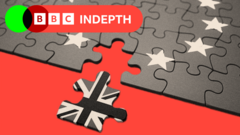With a summit between UK and EU leaders on the horizon, discussions around security partnerships, trade deals, and immigration policies reignite passions on all sides. As the Labour government aims for improved ties, critics warn of a potential 'sellout' of Brexit promises, while proponents see opportunities for economic growth and collaboration.
Britain’s Evolving Relationship with the EU: Steps Towards Cooperation or Backlash?

Britain’s Evolving Relationship with the EU: Steps Towards Cooperation or Backlash?
The UK government prepares for a pivotal summit with the EU, stirring debates about the future of Britain’s post-Brexit relationships and cooperation.
On a sunny morning earlier this month, European politicians gathered at London’s historic Lancaster House for a meeting focused on the future of UK-EU relations. The surroundings echoed a long history of intertwined destinies—reminders of pivotal moments in British and European affairs. Hosted by Foreign Secretary David Lammy, the meeting was the backdrop to crucial discussions on the ongoing war in Ukraine and the need for enhanced security cooperation between the UK and the EU. Significantly, the summit scheduled for May 19 marks the first official interaction between the UK and the EU since Brexit.
Before leaving the EU, UK prime ministers would frequently engage in high-stakes negotiations in Brussels. But since then, such diplomacy has been nearly non-existent. The current Labour government, which campaigned on a platform promising a revitalized partnership with Europe, is now seeking to rekindle those diplomatic ties. The upcoming summit will focus on establishing a new collaboration, as Sir Keir Starmer is set to host top EU leaders.
Pedro Serrano, the EU Ambassador to London, described the summit as a pinnacle of improved communication since the 2024 UK elections. However, questions arise about whether this will be perceived as a step back regarding Brexit or an opportunity for pragmatic engagement, as opposition voices question the government’s intentions.
Among the topics on the agenda is a potential UK-EU Security and Defence Partnership, an idea once dismissed. With the UK’s focus having largely been on distancing itself from Brussels, this renewed effort has drawn contrasting reactions. EU foreign policy chief Kaja Kallas emphasized the necessity of moving forward despite previous tensions, while some in the UK argue that NATO remains the essential security backbone.
On the economic front, industry leaders express optimism regarding a proposed security partnership, which could open doors for UK businesses to access significant EU funding. However, detractors question whether it aligns with national interests or amounts to a capitulation to a bureaucratic European structure.
The UK’s aspiration to negotiate a 'veterinary’ deal aimed at reducing food and drink border checks has sparked political contention. Proponents, including Cabinet Office minister Nick Thomas-Symonds, advocate for the benefits to British businesses, arguing that trade can flourish without overwhelming paperwork. Critics within the Conservative party caution against what they perceive as a danger to British sovereignty, claiming that aligning regulations with the EU’s could undermine Brexit objectives.
As the government contemplates future relations, discussions around fishing rights and a proposed youth mobility deal have emerged as further points of contention. The government’s past compromises during Brexit negotiations over fishing have dissatisfied many in the UK fishing community, and future negotiations may become battlegrounds for leveraging concessions.
Despite the potential political fallout from such negotiations, observed public sentiment indicates a more nuanced view of immigration, particularly regarding young professionals. Some experts posit that the perception of immigration remains largely focused on illegal crossings rather than legitimate work opportunities for young individuals.
As the Labour government prepares for the upcoming summit, opponents are already framing it as a return to previous overreaches in EU relations. However, Starmer maintains that the intentions are solely to enhance the post-Brexit landscape for British citizens without compromising established red lines regarding European unity.
The week ahead promises to bring significant discussions about Britain's evolving place in Europe amidst calls for collaboration while balancing concerns from various political factions. While the Lancaster House meeting symbolizes a step toward re-engagement with the EU, critics remain poised, questioning if this truly signifies progress or a retreat into a complex political web.






















